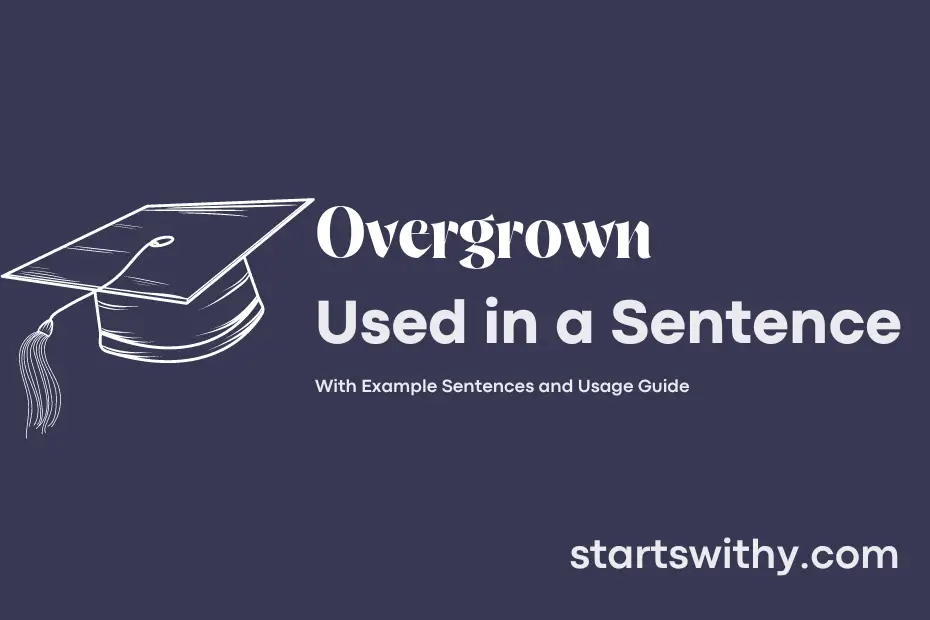Have you ever come across a neglected garden or abandoned building with an overgrown, tangled appearance? When something is overgrown, it means that it has not been properly maintained or cared for, leading to an unruly and wild state.
When objects or spaces become overgrown, they can lose their original purpose or beauty, becoming obscured by tangled vegetation or clutter. This can be seen in various settings, from neglected properties to forgotten pathways, where the encroaching growth symbolizes neglect and abandonment.
7 Examples Of Overgrown Used In a Sentence For Kids
- The overgrown bushes are blocking the pathway.
- The overgrown grass needs to be cut with a lawnmower.
- The garden has become overgrown with wildflowers.
- We need to clear out the overgrown vines from the fence.
- The jungle gym is hidden behind the overgrown trees.
- The overgrown plants are taking over the garden.
- The abandoned house has an overgrown backyard.
14 Sentences with Overgrown Examples
- The overgrown bushes outside the college campus need to be trimmed.
- The overgrown vines have started to cover the walls of the old building.
- The overgrown grass on the sports field makes it difficult to play on.
- The overgrown library shelves need to be organized and decluttered.
- The overgrown trees near the hostel provide a picturesque view.
- The pathway to the canteen is hidden by the overgrown plants.
- The abandoned basketball court is now covered in overgrown weeds.
- It’s hard to walk on the sidewalk with all the overgrown shrubs blocking the way.
- The fountain in the college courtyard is surrounded by overgrown hedges.
- The overgrown courtyard garden needs some maintenance before the event.
- The overgrown bushes near the classroom windows obstruct the view.
- The neglected greenhouse is now a forest of overgrown plants.
- The secret garden behind the college has a mysterious, overgrown aura.
- The outdoor seating area has become overgrown with wildflowers.
How To Use Overgrown in Sentences?
To use the word Overgrown in a sentence, you can describe something that has grown excessively and looks untamed or wild. For example, “The overgrown garden was filled with weeds and tangled bushes.”
When using Overgrown, consider the context in which the word is being used to accurately convey the meaning of something that is excessively grown or not properly maintained. It can refer to a variety of things such as vegetation, hair, or even a space that has been neglected over time.
To make your sentence more descriptive and vivid, you can include details about the specific characteristics of what is overgrown. This will help paint a clearer picture for your audience, allowing them to better understand the extent of growth and neglect being described.
Remember to use appropriate punctuation and grammar when constructing your sentence to ensure clarity and coherence. You can also vary the structure and style of your sentences to keep your writing engaging and interesting for the reader.
By following these simple guidelines, you can effectively incorporate the word Overgrown into your writing and communication to create vivid and descriptive imagery.
Conclusion
In summary, sentences with the keyword “overgrown” were used to describe areas or objects that had become covered with an excess of growth or vegetation. The vivid imagery painted by these sentences allowed readers to envision neglected spaces or objects overwhelmed by nature, highlighting the consequences of neglect and lack of upkeep.
Through the use of sentences with “overgrown,” the concept of abandonment and neglect was effectively conveyed, evoking feelings of isolation and decay. This keyword served as a powerful descriptor in creating a visual image of unchecked growth that can symbolize the passage of time, neglect, or the reclaiming of spaces by nature.



